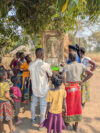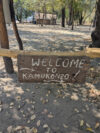
Conservation can only be successful with the direct participation and support of local communities. That’s why our community engagement programs focus on creating a feeling of ownership and fostering a positive attitude toward conservation among local residents. We work with local partners to promote a sense of ownership, ensuring communities actively participate in and benefit from conservation efforts.
Discover our approach to community-led conservation and how we collaborate with local conservation clubs and academic institutions to make a lasting impact in Zambia.
Community Partners
Nsanga Conservation works closely with the Chitungulu Conservation Clubs, managed by the Chitungulu Foundation, and the School of Natural Science at Copperbelt University in Zambia to expand local employment, capacity building, and leadership initiatives. Each year, several members from the Conservation Clubs and Copperbelt University contribute their expertise to Nsanga through paid internships or employment opportunities.










